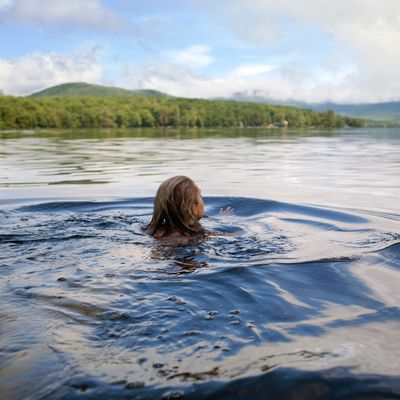
This week, the Cut reflects on self-reflection with a series of stories devoted to the art of memoir.
(This piece is a previously unpublished excerpt from the diary that became The Folded Clock.)
August 21: Today I went swimming in Berlin. I should be clothes shopping — everyone says the clothes shopping is so great in Berlin, I really have to shop! — but I prefer to swim. The summer isn’t over yet. Clothing is a winter worry.
I am not a Lake Person, but there’s a lake near the villa where we’re living, and it’s big enough to seem, at a glance, like a harbor or a bay. As I walk down the dock, I trick myself into thinking, This is ocean, this is ocean, this is ocean. Lakes are creepy. Where do the dead things go? This is why people are buried at sea but never at lake. The sea is a clean vanisher. A lake is a morgue.
The water was bright green and opaque; algae, I was told. Not the stringy kind but the kind that resembles the health powders my husband adds to smoothies. The water had a smoothie thickness, too; by my standards, warm. I’d had a few frigid near-death swims earlier in the summer, so granted I was not the best judge of warmness. All water seemed warm by comparison. During those cold swims, I came to better understand how one dies of hypothermia. Once I was swimming to an island and back, and I just got … bored. Bored with swimming. Buoyancy was such a trial, and to what end? Why the bother? My movements became perilously slow. When I finally emerged from the water, I was chattering so violently I thought my jawbone was going to explode. I had to sit in a hot bathtub for an hour.
The moment my body temperature regulated, I wanted to swim again.
Most people discover the joys of almost dying in their youth, when death is a novelty. Not me. Dying’s never been my high. I got good grades, I obeyed authority figures, I stayed really alive. Now I understood the I’m-most-alive-when-I’m-almost-dead perspective. What I ask myself, as I swim past the mansions on this German lake, is Why now? I have spent the past 40-odd years avoiding cold water (despite growing up in Maine, it is only recently that I’ve come to enjoy cold-water swimming). I have classically hated anything “recreational” that caused physical pain. I hated hiking and biking and running. I also hated the people who loved these activities. I broke up with a guy once because he gave me a book of nature essays. Nature. I did not give a shit about nature. Now I only want to be in nature. I want to be always almost-dead in nature.
I tried to articulate this desire to my London friend the other night in a Berlin bar. We wore the same clothes as everyone else in the bar, and all of us were familiar with the music being played on the stereo, and the German bartender knew, without looking it up, how to make a whiskey sour. European travel used to be a cold-water swim, but now it isn’t.
To my friend, about my fondness for hypothermia, this is what I said: I want to experience my body working before it starts to stop working. When I was briefly sick, I became aware of what had been invisible to me — health. I no longer wanted my health to be invisible or intangible. I wanted to feel health. Every day I wanted to feel it. The best way to do this was to submerge myself in icy water and then enjoy my body’s dogged churn back to life. I’d developed what might be called a pain routine. When I first entered the water and took an initial temperature reading with my feet, I could predict, once fully submerged, exactly when the water would stop hurting; knowing this made the initial sting less shocking. I no longer tensed against the cold. I breathed into it.
The more I talked to my London friend in the Berlin bar, the more I sounded like an American New Age birth coach. Maybe there’s a connection between hypothermia and labor; I still remember the high I experienced after my first child was born. This high was not emotional — it was purely, cleanly physical. I was never in my life such a body. I thought, This is why women have more children. This is why they endure nine months of pregnancy, and labor, and the massive expense and inconvenience of raising all the humans that result — to experience 48 hours of euphoria. It was totally worth it.
But my second birth high wasn’t as great as the first. My second Berlin swim wasn’t as great as the first. The best thing about my first Berlin swim was this. When I took off my bathing suit, the crotch was bright green from the algae that had collected there. It was like getting my period for the first time and seeing the shock of color where normally there is only white.





